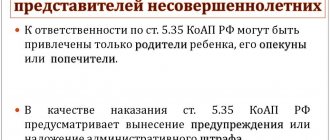Conditions for recognition of disability
The conditions necessary for recognition as a disabled person are set out in Government Decree No. 95 of 02/20/2006. These include:
- impairment of body functions due to injury or disease, characterized by resistance;
- loss of the ability to care for oneself, move without assistance, study or work;
- need for social protection.
If only one of these grounds is present, it is impossible to obtain a group. Depending on how severe certain health disorders are, grades I, II, and III are assigned. disability. Children under 18 years of age are classified as “disabled children.” The date on which a citizen is recognized as disabled is the day on which an application to this effect is received from him in the bureau of medical and social examination.
Alimony for the maintenance of a disabled child under 18 years of age is paid in accordance with the general procedure. As for disabled adult children, there are a number of features that will be discussed in detail below.
Amount of payments for disabled children under 18 years of age
Collection of payments for a son or daughter who is not an adult (including disabled children) is regulated by the provisions of the Family Code of the Russian Federation. They state that a person obligated to support his children must be charged monthly alimony from earnings and other income. Depending on the number of children, payments are:
- for one minor – 1/4 of the total income, or 25%;
- for two children – 1/3, which is 33%;
- for three or more – 1/2, or 50%.
When the alimony payer does not have a regular income, an official salary, or has earnings in foreign currency, in kind (in whole or in part), the maintenance is established in a fixed monetary amount. It is calculated in accordance with the regional or national subsistence minimum per child and can be, for example, 0.7 or 1.2 of it.
If the child is disabled, the court may order additional maintenance necessary for:
- purchasing expensive medications;
- payment for specialist consultations;
- placement of the child in a private clinic;
- nurse invitations.
Hiding income
Is it known for sure that the unemployed alimony worker is not as poor as it appears from the certificates he presented to the servants of Themis? In this case, it makes sense to ask the court to send an order (writ of execution) directly to the bailiff. It is important to stay in touch with the representative of the law and promptly inform him of everything that is known about the financial situation of the debtor. The bailiff, at the request of the applicant, sends requests to the branches of the Pension Fund, the employment service, banking organizations and tax authorities; identifies “gray” income from business activities.
See also:
Deprivation of a driver's license for non-payment of alimony: transferring the debtor to public transport
The independent “detective” activity of the plaintiff in order to collect evidence of the ex-spouse’s untold treasures, as a rule, does not give the desired results. Referring to commercial (banking) secrets, “informed” managers of the relevant organizations will most likely not provide confidential information at the request of a private person.
Child support for a disabled adult child
According to Art. 85 of the RF IC, payment of child support stops when he becomes an adult or is emancipated, i.e. he becomes legally capable before the age of 18. But there is an exception. When a child has reached the age of 18, he has the right to claim money from his parents if two conditions are simultaneously met:
- A disabled adult child cannot work.
- He needs financial assistance.
In the above cases, the parents’ obligation to support the child remains in force.
What is disability and neediness?
Disabled people , among others, include children over 18 years of age who are disabled. As mentioned above, to confirm this status, a medical and social examination report is required.
But the fulfillment of this condition alone is not enough to assign alimony payments; it is also necessary to prove in court the need of a disabled person for financial assistance, that is, his need.
Need is defined by law as:
- Lack of ways to independently support your existence.
- Insufficient benefits and pensions received from the state for disability.
If a person who has been disabled since childhood was able to get a profession and has a good income, he does not have to count on help from his parents.
In addition to the child himself, according to Article 89 of the RF IC, the mother can also receive alimony when she is caring for:
- for a disabled child until he reaches 18 years of age;
- for a child who has been disabled since childhood and has group I - no time limit.
In this case, she needs to file a claim in court. When assigning alimony, the need of the mother and the financial situation of the father will necessarily be taken into account.
Registration on a voluntary and compulsory basis
The voluntary method consists of concluding an agreement between the parties, which must be certified by a notary. The agreement on the payment of alimony can specify any amounts, except those that violate the interests of each of the parties. Otherwise, the notary will refuse to certify such an agreement, and it will be considered invalid.
The compulsory method obliges you to file a claim in the magistrate's court in the place where either the plaintiff or the defendant lives.
When a disabled child has reached the age of majority, he himself can sign an agreement or application to the court or entrust this action to another person by issuing him a notarized power of attorney. If there is incapacity, the papers are signed for the disabled person by his legal representative, who is obliged to confirm his authority (except for parents of minor children). There is no need to pay a state fee when filing a claim.
If need and ability to work are confirmed by the court, the claim for alimony payment is satisfied by being assigned:
- in a fixed amount of money;
- based on the situation of the parties – both financial and family.
In this case, the judge takes into account:
- income received by the plaintiff and defendant;
- whether the plaintiff’s parents have other persons to support them;
- whether the parents themselves are able to work;
- How white is an adult disabled child.
If alimony is awarded to an adult disabled child, he does not lose the right to receive assistance from the state.
What documents are required for registration?
As mentioned above, in order for a disabled child to receive alimony forcibly, it is necessary to write a statement of claim. When the child reaches adulthood, he needs to go to court again.
The statement of claim must comply with the norms of the Code of Civil Procedure of the Russian Federation and contain the following information:
- The name and address of the court to which it is filed.
- Full name, address, contact details of the plaintiff.
- The same information about the plaintiff’s representative, if available.
- The same information about the defendant.
- Circumstances of the case concerning the relationship between the plaintiff and the defendant, information about disability, inability to work, the need for financial assistance, justification for the amount of alimony obligations.
- The essence of the requirement for the defendant to recover maintenance.
- List of attached documents.
- Signature.
- Date.
The following documentation must be attached to the claim:
- Passport of a disabled child (copy).
- Birth certificate or paternity/maternity certificate (copy).
- Confirmation of disability in the form of an ITU certificate.
- Certificates of benefits and pensions paid to the plaintiff by the state.
- Documents confirming the defendant's income.
- Certificate from the housing department about family composition.
- Other documentation on which the calculation of the amount of alimony is based.
statement of claim for the recovery of alimony for a disabled child.
Exemption from alimony payments
Article 120 of the RF IC N223-FZ of 1995 establishes a list of cases:
- death of the payer;
- loss of ability to work: as a consequence of this process - the inability to support a child;
- expiration of the agreement;
- when a disabled child reaches 18 years of age;
- obtaining the status of an individual entrepreneur, that is, engaging in an independent type of business;
- a person’s entry into a legal marriage relationship;
- restoration of the ability to work independently;
- waiver of the rights of a parent or guardian;
- deprivation of parental rights, challenging them.
According to Art. 3 of the Code of Civil Procedure N138-FZ of 2002, the alimony payer who understands that he has the legal right to withdrawal is obliged to write a corresponding statement to the court. After the judge has accepted the document, the latter will consider the reasons that prompted the plaintiff to act, thus comparing his demands with the provisions of the legal acts. Based on this, the court will decide whether to satisfy the claim or make a decision to refuse.
What is needed to increase payments for a disabled child
If the amount that a disabled child receives is not enough to meet his immediate needs and cover the costs of treatment and rehabilitation, he can apply to the court with a request to increase it.
To do this, you need to collect documents confirming these circumstances and attach them to the claim. Such documentation may include:
- recipes;
- bills from a paid clinic;
- checks, receipts, bank statements indicating payment for medical services;
- agreement with a nurse;
- tickets for travel to the place of treatment.
As a rule, courts take into account the financial difficulties experienced by disabled adult children and increase the amount of their support. But at the same time, the financial and marital status of the other party is always taken into account.
The alimony worker does not officially work at the enterprise, but has an inconsistent income
You can learn about the procedure in which alimony is collected from parents who do not have a permanent income from the provisions of Art. 83 RF IC.
It says that if there is no agreement between the parents on the maintenance of children, the collection of alimony in the absence of a permanent income can be made both in a fixed amount and in shares, and a combination of such methods is also possible.
An example is a situation where part of the income comes from funds received from renting out an apartment. The other part is one-time part-time work, not officially registered. Then it is advisable to establish a share of earnings on rent. And if it is small and does not cover the costs of supporting the child, thereby violating the interests of one of the parties, you can additionally claim a fixed amount.
The judge determines its size taking into account:
- opportunities for children to maintain the level of support they previously had;
- the family and financial status of each party;
- other circumstances worthy of attention.
writ of execution
Is it possible for an alimony holder to reduce the amount of alimony payments?
The amount of alimony can not only be increased, but also reduced. To do this, the person paying the money must file a claim in the magistrate's court. The circumstances that need to be referred to and that can be taken into account by the judge are the following:
- The child being cared for earns a good living.
- The parent owns real estate that can generate rental income, and the child received the property as a gift.
In addition, the alimony holder’s financial situation may worsen for the following reasons:
- income level has decreased;
- children were born in the new marriage;
- he began to pay alimony for other claims;
- became seriously ill or disabled;
- forced to provide for disabled parents.
This list is not closed. There may be other reasons that the court considers valid, but all circumstances must be documented.
Statement of claim to reduce the amount of alimony.
Decor
Alimony for a disabled person in 2015 can be arranged in two ways.
- Based on an agreement that is voluntarily concluded by husband and wife (including after a divorce), and then certified by a notary.
- Based on a decision of a judicial body , if consensus cannot be reached and it is necessary to resort to the help of the state. The court takes into account the financial situation of each party, as well as other factors, when collecting funds.










